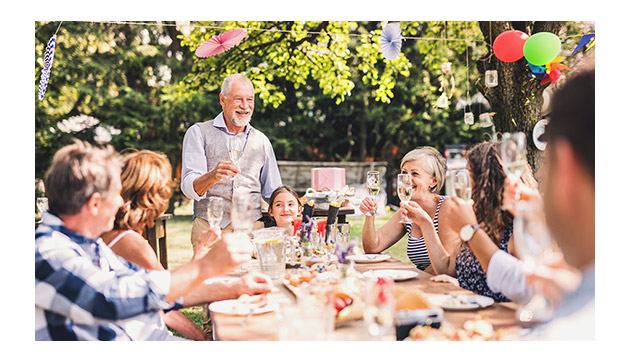Why Wait? The Importance of Eulogies for the Living
Perhaps the old saying that “eulogies are wasted on the dead” is true, and we should let our loved ones know how much they are treasured while they’re still with us.
Jan 23, 2023
As you get older, funerals and memorial services for loved ones and friends become more frequent. This is a difficult part of the natural progression in life as you age. Paying respect to the deceased reminds you of all that you will miss about that person, how special they were in your own life, and calls into consideration your own mortality.
Traditionally, services for the deceased feature a eulogy, a spoken tribute that captures the essence of the deceased by highlighting the positives of his or her life. Some are somber reflections while others inject humor to tell the story of a life well-lived.
Eulogies serve a valuable purpose in the grieving process by allowing friends and family to express their feelings and memories of the departed. They also provide a sense of closure and finality, allowing the bereaved to begin to come to terms with their loss while celebrating life.

Memorable eulogies
Recently, we attended the funeral of our sister Julie’s mother-in-law, Anna Mae Mulligan. Her nephew and godchild, who happens to be a priest, delivered a beautiful eulogy as he spoke about all her little peccadilloes, mannerisms, and her love of thrift shops and giving things away. He also talked about the impact of her growing up poor and being poor for a good chunk of her life, and how she made the best of it.
A few weeks earlier, Jim attended services for another friend, Mary Auletta, who died in her eighties. Her husband Dick and their daughter Kimberly, who is a pastor with her own congregation in Brooklyn, gave beautiful remembrances. Jim was struck by how the things that might have been annoying at one time or another about Mary while she was living, were recalled so fondly and were a vital part of her character and makeup.
Dick spoke about how Mary would walk in the front door, instantly kick off her shoes and leave them there haphazardly. It was the cause of several “conversations” about scattered shoes over the years. Dick finished off by saying, “I just wish I had one more chance to kick those shoes out of the way.”
Do we have eulogies backward?
When Jim listened to stories about who Mary and Anna Mae were, it dawned on him that maybe we have eulogies backward. Perhaps we should eulogize, in a manner speaking, our friends, family members, and those nearest and dearest to us while they are alive.
After all, the word “eulogy” comes from the Greek word eulogia and literally translates to “good word” or “true word.” Over time, the term has been used to describe a speech that’s delivered only after someone has died. But there’s no reason to wait.
A eulogy for the living can help us adjust our thinking about that person, their characteristic,s and annoying habits so that we frame them differently as to what makes them unique, special, different, and so lovable while they are still alive.
It’s a raw and very vulnerable exercise, but how might we go through the process of eulogizing those near and dear to us in their living years?
Eulogies for the living
A eulogy for the living is a way for us to show appreciation for the people we have in our lives right now, and to let them know our thoughts while they are still in our lives. Many of us might be a bit reluctant to share because we’re shy or embarrassed about communicating honestly how we feel; however, consider the alternative. How many of us, when someone dies, regretfully lamented that we never had the chance to say goodbye or, “I love you?”
Garry, a friend of our community, shared that he recently lost his sister to cancer at the age of 55. “She was adamant about not wanting any type of memorial service,” Garry says. “Jenny had a crazy sense of humor. She said that she just wanted her ashes scattered in several of her favorite places, and wittingly said, ‘Absolutely no eulogies. I already know what everyone thinks about me.”
There’s an old saying that great eulogies are wasted on the dead. Perhaps Jenny, who recently passed, provided a clue about eulogies being more for the living when she said that she knew what everyone thought about her. Possibly we can take a cue from that and let our loved ones know how much we treasure them – before it’s too late.
All the best,
Chris & Jim








